Dishwasher Salt
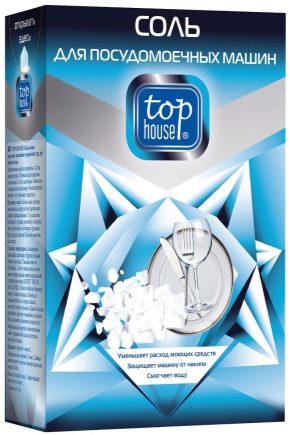
A dishwasher is a complex household appliance that requires special care for long-term trouble-free operation. One of the most important tools that can extend the life of an irreplaceable household helper is special salt.
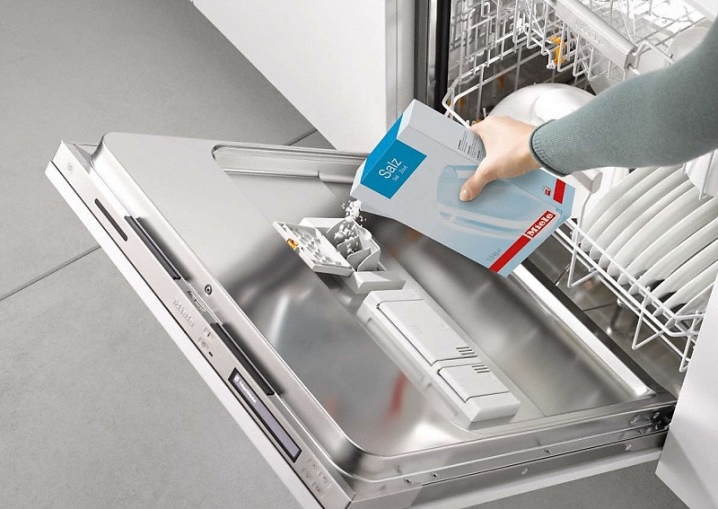
Features and purpose
It's all about the hardness of the tap water. In its original form, it is not suitable for a dishwasher - calcium and magnesium ions over time form scale on metal elements, which can damage the device. Also, the efficiency of washing dishes in soft water is much higher.
The manufacturers foresaw this problem and built a special container filled with ionized resin into the design of the machine. Hard water, passing through it, is softened by the sodium ions contained in the substance. Negatively charged sodium neutralizes positively charged magnesium and calcium ions, which makes the water soft.
It would seem that the machine itself copes with water softening, then why do we need salt. Everything is quite prosaic - the resource of ionized resin is not at all eternal. For proper operation, it is required to feed it with sodium ions, which are exactly contained in salt.
Therefore, it is very often called regenerative.
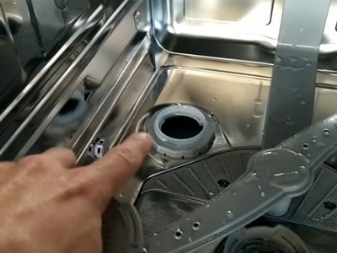
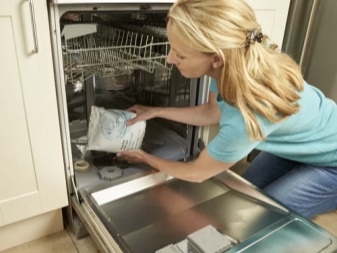
Salt has the following functions:
- softens hard tap water;
- improves the quality of dishwashing;
- protects the internal elements of the machine from scale;
- restores the resource of ionized resin;
- protects dishes from harmful plaque.
Next, the question arises, what is the difference between special dishwasher salt and ordinary table salt.
The chemical composition is identical, and the cost of the cookery is much lower.
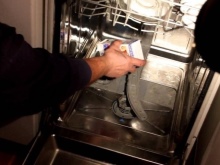

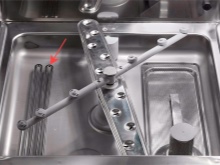
And the difference lies in the additional purification, processing and structure of the special salt. Also, its crystals are larger. It looks like a homogeneous granular mass or like compressed tablets.
Regular table salt, alas, cannot cope with such a difficult task as water softening. It is of a lower quality of cleaning, dye, flavoring or iodine can be added to the composition, which can greatly harm the household appliance and shorten its service life.
During production, great attention is paid to the choice of the place of extraction, as well as to thorough cleaning.
Any additional chemical impurities can not only reduce the effectiveness of the substance, but also themselves cause scale.
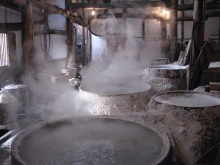
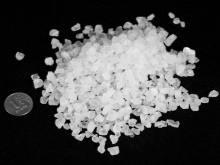
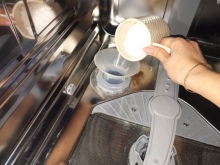
The existence of car products such as 3-in-1 detergent can be confusing. Is it necessary to additionally use salt with it - there is no definite answer, you need to study the composition of the detergent. Many manufacturers have already added salt to it, but there are those who have neglected it.
If the selected 3-in-1 product contains a sufficient amount of purified salt, then no addition is required. But you can pay attention to the type of surfactant in the composition. It is better to choose milder non-ionic surfactants.
The use of special dishwasher salt in one form or another is indispensable for the long-term service of the dishwasher, because its action has a beneficial effect on all internal elements.
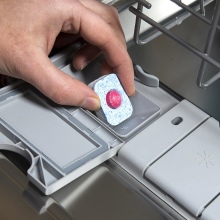
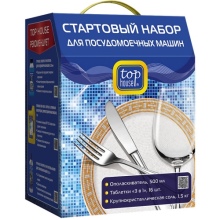
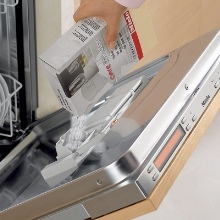
Composition
As mentioned above, high-quality dishwasher salt is well cleaned of various impurities and has a pure chemical composition.
However, there are always a lot of unscrupulous manufacturers who want to reduce the cost of production. This concerns mainly detergents in 3-in-1 tablets. Their composition does not always consist only of mild detergent, rinse aid and salt. Sometimes they contain rather aggressive surfactants, which are not always washed off with water and can be harmful to health. Therefore, it is recommended not to choose universal tools, but to purchase everything separately.
There is also a polyphosphate salt, which is usually found in flow filters. It softens and purifies tap water due to its chemical composition and also depletes its resource as an ion exchanger. Therefore, if a filter with polyphosphate salt is used, it must be refilled periodically. How often this needs to be done depends on the quality of the water and the frequency of use, but on average no more than once every 400-450 cycles.
The use of a polyphosphate salt filter complements the work of the ion exchanger and does not in any way preclude the use of ordinary salt, which was mentioned above.
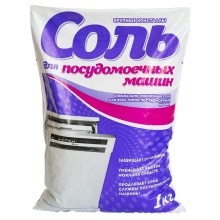
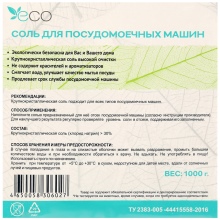
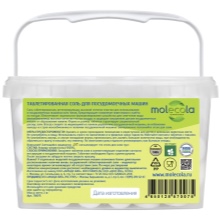
Forms of issue
Regenerating salt for dishwashers is available in the form of compressed tablets or granular mass. Each type has its own disadvantages and characteristics.
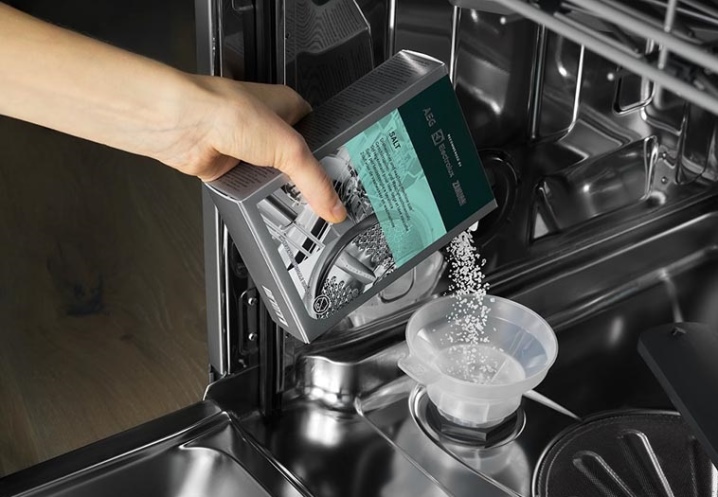
Tableted
The main advantage of using tableted salt is simplicity and ease of use. It does not wake up and is easier to dose, which makes it a popular option.
However, not all dishwashers have an ion exchanger in which tableted salt can be put, and it is not always possible to do this simultaneously and in the required amount.
There is also an opinion that such tablets dissolve worse than granular salt, although it is not entirely correct.
Therefore, despite its convenience, pressed salt is not always the best option.
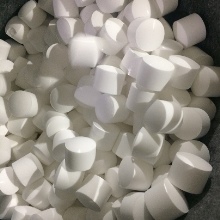
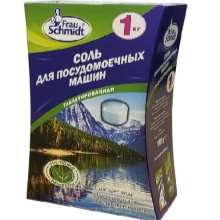
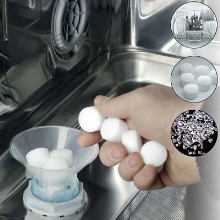
Granular
It dissolves perfectly and is suitable for absolutely any dishwasher. Falling asleep is facilitated due to the fact that most manufacturers have already taken care of consumer comfort and equipped the device with a special funnel. However, when using granular salt, you must independently calculate its amount and the frequency of falling asleep in the dishwasher. A one-time dose is most often half a kilogram, and the frequency depends on the hardness of the tap water and the frequency of use of the dishwasher. The cost is generally slightly lower than that of the tablet. But this only works if their manufacturers are in the same price segment.
Otherwise, you always have to pay extra for the brand, and granular salt may turn out to be even more expensive than tablets.
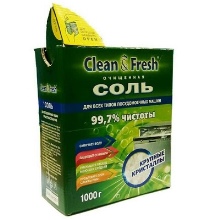
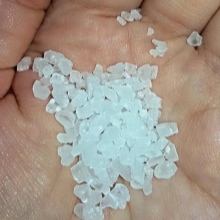
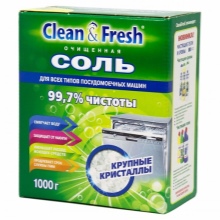
Rating of the best brands
It is almost impossible to single out any unambiguous favorite manufacturers in this category of goods. Usually, when choosing certain products, the buyer is mainly guided by the composition, which is logical and correct.
It is rather difficult to assess manufacturers whose product is identical in composition. Indeed, high-quality dishwasher salt should contain only sodium chloride. So it is, and the market is represented by a product with a chemical composition of 99.5-99.7% pure salt. And it's almost impossible to stand out here.
The only adequate criterion for quality is the particle size when it comes to granular salt. They must be large enough and at least 4-6 mm in size. If the particles are too small, they can form an insoluble lump that clogs the hoses of the machine and renders it unusable.
Due to insignificant differences between different manufacturers, this rating is rather a list listing the main features of the products.
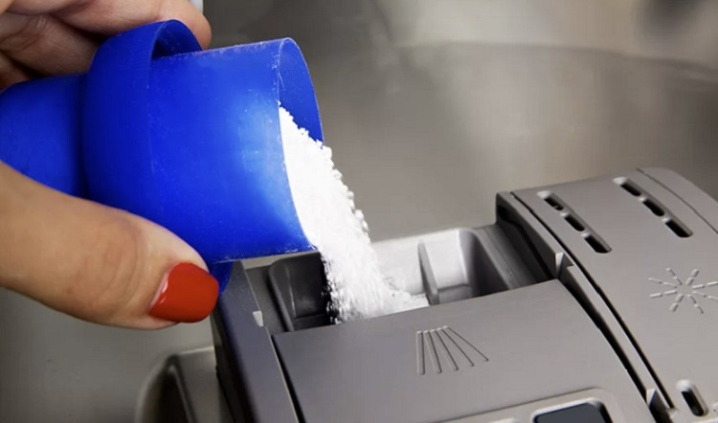
Paclan Brileo. One of the best products on the market. The highest quality, low price, convenient packaging and the complete absence of bad reviews make this salt an excellent option for constant use.
Filtero - coarse-crystalline salt, providing long-term softening of hard water.Differs in economy: one sachet is enough for 1-2 months. The product is non-toxic and does not contain any harmful impurities, does not remain on the dishes and cannot harm your health.
Suitable for water of medium hardness, which is the main disadvantage of the product. If the tap water is oversaturated with iron and very hard, then the flow rate will increase significantly. And hence the cost.
Finish. A very popular salt due to the awareness of the advertised brand. The product is distinguished by an abundance of good reviews, the size of the crystals and the complete fulfillment of the main tasks assigned to it. Suitable for various dishwashers, does not leave deposits on dishes, protects the machine from limescale.
Refers to the middle price segment.
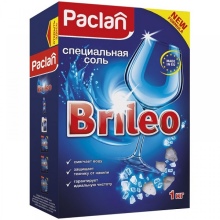
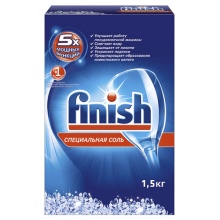
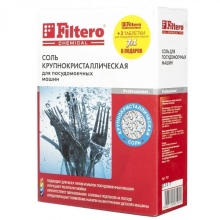
But as in the previous case, very hard water will greatly increase the consumption of salt, and then the cost will cease to be budgetary.
Top House. Differs in the largest granule size and the highest cost. But due to the fact that such large particles dissolve for a very long time, the salt consumption is minimal. And this means that it is less often necessary to both fall asleep and buy, which is quite pleasant.
Salero. Belarusian production. Very coarse granules ensure long-term and economical use. The distinctive features of this salt can also be attributed to the fact that it is able to soften even the most hard water without a significant increase in consumption. And the low price makes this salt a godsend.
Snowter. The salt of this brand is notable for its low cost and good quality. It does not contain harmful impurities, almost 100% sodium chloride and does not remain on the dishes. The granules are large enough to ensure long-term trouble-free operation of the machine.
A significant drawback of this manufacturer is packaging in plastic bags, from which it is extremely inconvenient to dose the product into a special tank.
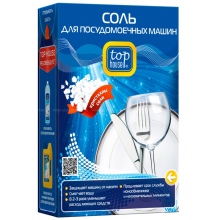
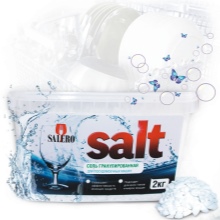
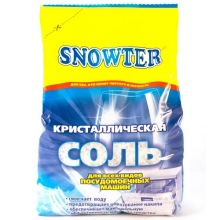
"Eonit" - the manufacturer positions its product as salt with small, but slowly dissolving grains.
According to the simplest laws of physics, the larger the granule, the slower it dissolves, and vice versa. Therefore, here everyone decides for himself whether to believe the manufacturer's promises or not. But it is recommended not to forget that fine-crystalline salt can form insoluble lumps that disable dishwashers. In fairness, it should be noted that there are practically no bad reviews of this manufacturer's salt.
Oppo. Excellent quality tableted salt. It dissolves perfectly, does not contain foreign impurities, is convenient to use, and the packaging allows you to store the product with comfort. The main drawback is that it is intended for use in machines of the same name and in dishwashers from other manufacturers, it may not be so effective.
Bioretto. The classic version, perfect for medium hard water and requiring a significant increase in flow in very hard water.
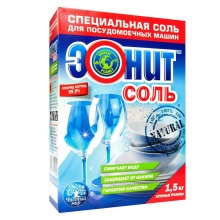
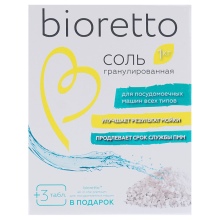
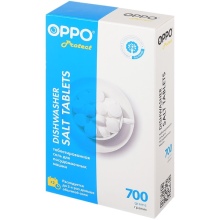
Sodasan. Excellent quality, suitable for softening very hard water. However, the cost is higher than the market average.
Somat. A good salt that does a great job at softening water and preventing limescale build-up on the metal parts of the dishwasher. However, it should be borne in mind that the particle size is relatively small.
The differences between manufacturers are minimal. All presented products do an excellent job with their task, have an excellent pure composition without impurities, and therefore are safe for the operation of the dishwasher. The cost may vary, but it is undesirable to give preference to a too low cost, since the price for a more or less high-quality product starts from 100 rubles per 1.5 kg.
For maximum convenience and minimum consumption, it is preferable to choose more expensive salts with large particles.
Despite the high cost, they are even more economical to use, since they are consumed longer.
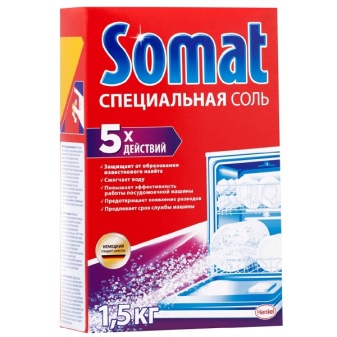
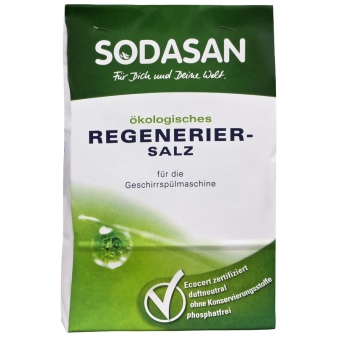
How to choose?
The choice of dishwasher salt should start with determining the brand of the manufacturer and the design features of the appliance. For example, some machines do not imply the use of tableted salt and are only suitable for granular.
Also, for an Oppo dishwasher, it will be preferable to use products of the same brand. It is important to take into account the technical characteristics of the dishwasher themselves, for what type of salt they are designed.
Most people prefer granular salt, but tablets are easier and more convenient to use. But granular is easier to buy, and the choice among manufacturers is quite extensive. The cost will depend on the brand and the expense.
The latter indicator can only be determined empirically.

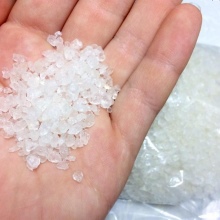
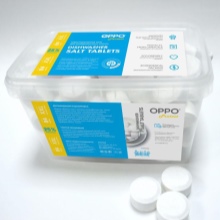
If unknown or unfamiliar brands are not credible enough, there is always an opportunity to turn to well-known advertised brands. But when choosing salt from any manufacturer, it is important to pay attention to the size of the granules. Even if fine salt does not harm the car, then its consumption will definitely be higher.
Attention to packaging. If you choose granular salt, it is better to immediately imagine how convenient it will be to pour it into the special container of the dishwasher. Plastic bags reduce the cost of salt due to the cheapness of the material, but it will be inconvenient to pour and dispense from such a package. Also, spilling past the tank is not excluded, and this is an extra expense and cleaning.
Besides, it must be borne in mind that salt is hygroscopic... This means that when stored outdoors, it will absorb moisture from the air and lose its properties.
Therefore, choose a package that will allow you to keep the product closed or get a special storage container with a lid.
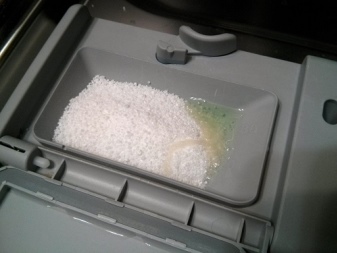
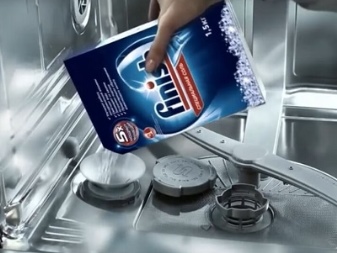
How to use?
There is nothing complicated or tricky about using dishwasher salt. Each user is able to fill the ion exchanger himself with it without any specialized assistance.
It is necessary to add salt to the dishwasher before using it directly.
- First open the dishwasher and remove the lower basket. It must be temporarily set aside so that it does not interfere.
- The salt container should be located directly below where the lower basket was, closer to one of the walls. Unscrew the cap of this tank.
- When using the dishwasher for the first time, pour a glass of water into the compartment. If the machine has been in use for some time, the water should be there and not need to be refilled. Salt dissolves in this water for maximum effect.
- Next, you need to pour special salt into the opening of the tank. The volume of this container may differ in different machines, so fill up until the tank is full. Water may overflow from the reservoir, which is completely normal. You should not be afraid of this or wipe it off. If the salt spills out, it is better to immediately collect it with a damp cloth.
- Screw on the reservoir cap tightly.
- Replace the lower basket.
- Place dirty dishes in the machine and start the wash cycle.
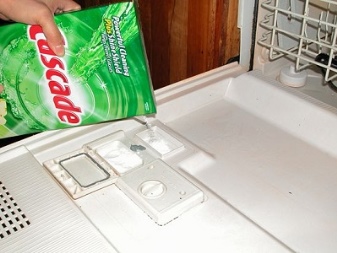
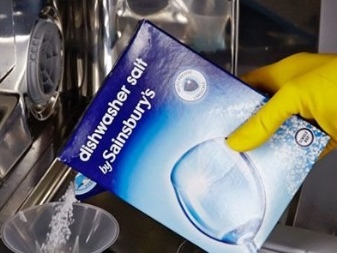
The principle of operation remains the same for tableted salt. You need to put 1-2 tablets in the tank, depending on the hardness of the water. If you cannot find a reservoir for salt, a carefully studied instruction for use can save you.
If the salt has run out or there is not enough salt to fill the tank completely, it is better not to use the technicians temporarily. Much depends on the situation, on the amount of salt available, the size of the granules and the hardness of the water. But it's best not to risk it and always fill the tank completely with salt.
In addition, there is a special indicator on the machine. He will certainly notify the user that the salt is completely out and needs to be added as soon as possible.
If your machine does not have a warning light, you should add salt to the tank at least once a month.
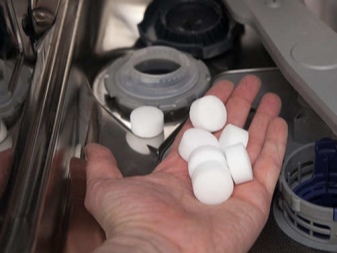
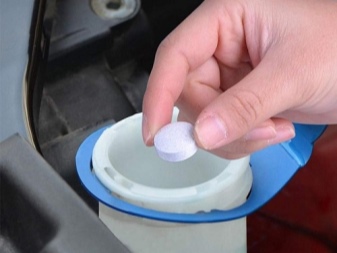
Smears on the dishes can also signal that the salt in the tank has run out. If the machine is equipped with an indicator, but it did not make it clear that the resource of the ion exchanger is exhausted, and a white coating appears on the dishes, check the presence of salt yourself and call a dishwasher repair technician. This shouldn't be, and there is probably something wrong with the dishwasher.
When buying a dishwasher, you need to be prepared that maintaining a working condition requires consumables such as detergent and limescale salt. Without the first, the machine simply will not be able to perform its work with high quality, and without the second, it will serve for a long time and regularly.
Limescale build-up from hard tap water inside the dishwasher can damage the dishwasher. Hard water also leaves a white coating and streaks on dishes, which can seriously upset the consumer and make them regret buying.
Therefore, salt should never be neglected, and a small waste today can save you from global costs tomorrow.
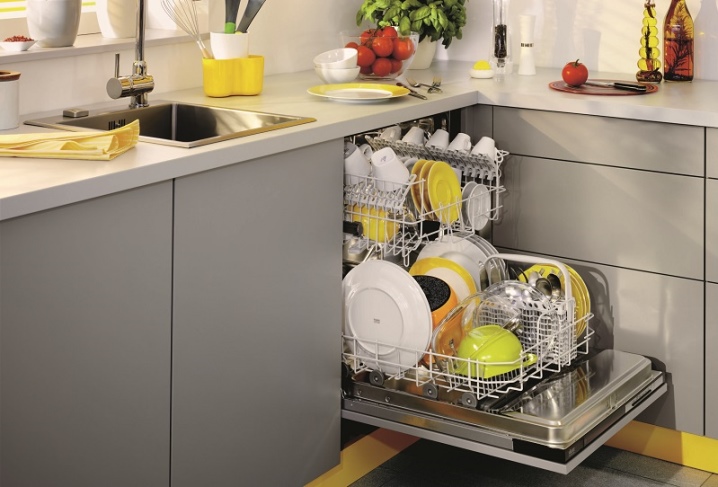













The comment was sent successfully.